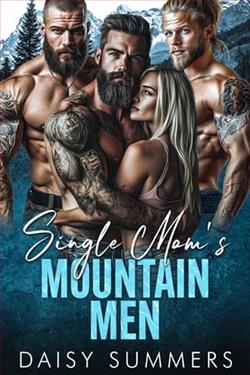Page 64 of Miss Dashing
“Johnny hasn’t a chance,” Edna said, sounding pleased as she leaned out over the balcony along the gallery, field glasses trained on four galloping horses. “That chestnut of his is all flash and no dash.”
Hecate agreed. The weather had obliged with a lovely afternoon, the ground only slightly softened by the overnight rain. The riders had exploded down the Nunnsuch drive, twelve in number. Two were immediately straggling behind, six others had bunched in the posture of jockeys hoping the leaders would falter, and four others had knotted up in the lead.
Phillip, DeGrange, Johnny, and DeWitt still led the field as they thundered back up the drive. DeWitt’s bay was an unruly fellow, punctuating his strides with audible flatulence and tossing in the occasional buck, which might be why DeWitt hung at the rear of the leaders. The colt also had an odd way of going, nose low, rather than stretched forward to the utmost. DeGrange was on a black mare who looked to be all business. Excellent form, no frolicking.
Phillip’s gray gelding lacked elegance, but he had also settled into a punishing pace with the look of a horse determined to rise to a challenge.
Johnny’s chestnut, coat matted with sweat, was laboring badly, and a mile yet remained of the course.
“Johnny will win,” Hecate said. “Sheer ambition will carry him across the line.”
“Ambition doesn’t condition a horse,” Edna said, setting down her field glasses. “He had to have bought that nag in Portsmouth or London. Perhaps he leased the animal in Reading. In any case, a town hack isn’t up to country miles.”
The horse was trying, staying ahead of Phillip’s gray by half a head.
Or was Phillip allowing Johnny to hold the lead because the last mile always told the tale?
“There goes DeWitt.”
The big bay named Roland lengthened his stride without any apparent signal from his rider. The pack veered into the park and cut a wide swath along the creek as Roland passed DeGrange’s black. The black might have been at a sedate canter for the swift work Roland made of overtaking her.
“There’s our winner,” Edna said. “That bay has been merely gamboling, for all his strange way of going. I’m glad I didn’t oblige Johnny by betting on his chestnut. I fear Portia will be a few pence poorer for her choice of champion.”
The riders clambered up one of Nunn’s prized ha-has, pressing on to the open terrain flanking the formal garden.
“The chestnut is done,” Hecate said as Johnny applied his crop to quarters lathered in sweat. “The jumps have finished him.”
“The distance has been too much for him too. I tell you that’s a town horse. Matching white socks are fine for Hyde Park, but—there goes DeWitt again.”
The battle was now between Phillip and DeWitt, between experience and youth. DeGrange hung on in third place, while Johnny whaled away on his chestnut to no avail.
They cleared a final stone wall, Johnny’s chestnut stumbling on the landing, while the onlookers gave a cry of dismay. The chestnut righted himself, no thanks to the nincompoop sawing on the reins, and gamely trailed after the other three.
Fifty yards from the finish line, DeWitt all but threw away the reins, and the bay surged forward to take the race by two horse lengths. The spectators by the finish line whooped and cheered, some throwing caps into the air or holding their flasks aloft as Phillip took second and DeGrange third.
Johnny crossed the finish line, still whacking his horse.
“Bad form,” Edna said. “If you plan to marry that one, stay away from him when he’s been drinking.”
Sage advice. “I don’t plan to marry him.”
“Isaac says otherwise.”
“Johnny says otherwise, too, but he hasn’t courted me, and he has given me cause to take him into serious dislike.”
Not an admission Hecate had planned to make. She headed for the steps that connected the gallery balcony with the garden terrace. Edna followed, field glasses in hand.
“Oh dear.” She put the glasses to her nose.
Even from this distance, Hecate could see what gave Edna cause for concern. The first four riders had dismounted, and Johnny was bent on scolding his mount, smacking it about the quarters with the crop. DeWitt snatched the crop from him, Phillip took the horse, and a fine display of masculine pride—and stupidity—looked to be in the offing.
“Brompton men,” Edna muttered, “can seem to embody the best of the cavalier while occasionally exhibiting the worst of the cad. The combination grows tiring.”
Hecate glanced over at her in some surprise.
“I loved my husband,” Edna said, “but widowhood among the Bromptons has been challenging, and I fear Portia in particular takes too much after her papa’s side of the family. She’s set her cap for Lord Phillip, you know.”
“One suspected as much.”















